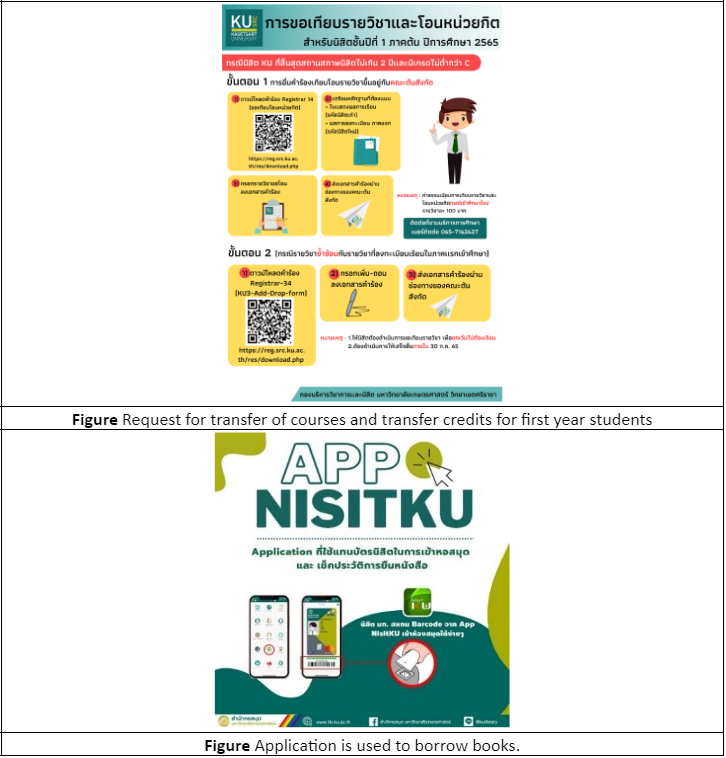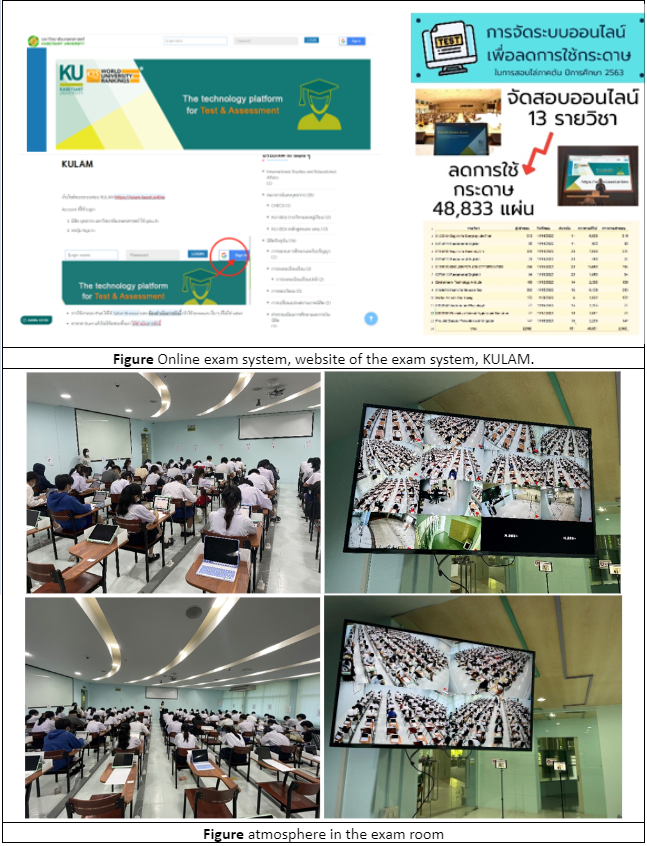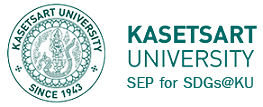
3.2 Program to reduce the use of paper and plastic on campus
Since a huge amount of solid waste has been generated in the university, waste management and recycling is a major concern at Kasetsart University. Waste segregation is also a matter of special attention to universities because some types of waste can be reused, recycled, or can be used to create value for waste. The university encourages all departments to participate in the reduction, sorting, and recycling of some waste. There are urges and warnings to personnel, students, and the general public to use resources wisely and to use them wisely.
 Plastic waste is a global problem that affects the environment and the health of people in society. National Research Council of Thailand (NRCT) revealed that to drive operations in the prevention and solution of plastic waste problems that affect the environment. Therefore, the cabinets have resolved to reduce – stop using plastic (plastic bags with handles, foam food containers, plastic glasses, plastic straws, plastic films, etc.) by using environmentally friendly renewable materials or “hundred percent” bioplastic or means completely abolishing by 2022. Since the use of plastic bags is a reflection of the daily habits of people in society, therefore, there must be preparation for both the producer and the consumer.
Plastic waste is a global problem that affects the environment and the health of people in society. National Research Council of Thailand (NRCT) revealed that to drive operations in the prevention and solution of plastic waste problems that affect the environment. Therefore, the cabinets have resolved to reduce – stop using plastic (plastic bags with handles, foam food containers, plastic glasses, plastic straws, plastic films, etc.) by using environmentally friendly renewable materials or “hundred percent” bioplastic or means completely abolishing by 2022. Since the use of plastic bags is a reflection of the daily habits of people in society, therefore, there must be preparation for both the producer and the consumer.
NRCT supports research funding to Kasetsart University in the project of “Single-use biodegradable plastic bags from thermoplastic starch base materials” by Assoc. Prof. Dr. Rangrong. Yoksan, Deputy Head of the Department of Packaging and Materials Technology, Faculty of Agro-Industry, is the head of the Bioplastics project. Bioplastics are divided into two groups: non-biodegradable, bio-originating, and biodegradable. The latter group of bioplastics is stronger and less durable than conventional plastics, and therefore cannot be used as a replacement for all plastic containers because some packaging has to bear a lot of weight, must be heat resistant, and require durability. This research project focuses on the development of biodegradable plastic bags containing TPS from cassava starch and biodegradable polyester to replace films and single-use plastic bags.
 Bio Bua, a container designed from bioplastics, won the award for best design and was invented from tapioca starch. ‘Bio Bua is a research paper in the field of bioplastics, which has been designed and invented using tapioca flour after agriculture in Thailand to form containers or products that can be produced in the industry, the material can be biodegradable in 180 days.’ ‘Bio Bua’ is designed as a food container, shaped like a lotus flower to give it a beautiful delicacy and a distinct Thai identity. It also looks modern, simple, easy to hold, comfortable to handle, safe to touch food. In addition, DEmark award-winning products will participate in the Good Design Award (G-mark) contest in Tokyo, Japan.
Bio Bua, a container designed from bioplastics, won the award for best design and was invented from tapioca starch. ‘Bio Bua is a research paper in the field of bioplastics, which has been designed and invented using tapioca flour after agriculture in Thailand to form containers or products that can be produced in the industry, the material can be biodegradable in 180 days.’ ‘Bio Bua’ is designed as a food container, shaped like a lotus flower to give it a beautiful delicacy and a distinct Thai identity. It also looks modern, simple, easy to hold, comfortable to handle, safe to touch food. In addition, DEmark award-winning products will participate in the Good Design Award (G-mark) contest in Tokyo, Japan.
 Mushroom Packaging ‘Urban Farm’: Special Award for Environmentally Friendly Packaging Design is the work ‘Urban Farm’ designed by Mr. Jennach Sodsai. ‘Urban Farm’ mushroom packaging is a packaging designed to look like bamboo internodes, made of bioplastics mixed with bamboo pulp, biodegradable in nature, refillable packaging, can be placed in a vertical garden that looks like bamboo clumps, suitable as a small mushroom garden for urban people, feels like picking fresh mushrooms from bamboo gorges according to the local way to eat.
Mushroom Packaging ‘Urban Farm’: Special Award for Environmentally Friendly Packaging Design is the work ‘Urban Farm’ designed by Mr. Jennach Sodsai. ‘Urban Farm’ mushroom packaging is a packaging designed to look like bamboo internodes, made of bioplastics mixed with bamboo pulp, biodegradable in nature, refillable packaging, can be placed in a vertical garden that looks like bamboo clumps, suitable as a small mushroom garden for urban people, feels like picking fresh mushrooms from bamboo gorges according to the local way to eat.
 The Ministry of Higher Education, Science, Research and Innovation has organized the MHESI project to invite people to maintain the environment to raise awareness and change waste separation behavior for students and staff within the university with technology and creativity through ECOLIFE application. Kasetsart University therefore invites students and staff to download an ECOLIFE application to reduce waste on campus.
The Ministry of Higher Education, Science, Research and Innovation has organized the MHESI project to invite people to maintain the environment to raise awareness and change waste separation behavior for students and staff within the university with technology and creativity through ECOLIFE application. Kasetsart University therefore invites students and staff to download an ECOLIFE application to reduce waste on campus.
In addition, the accumulation of ECOLIFE points can be redeemed for prizes to encourage students to participate in activities. For waste separation points, KU x ECOLIFE is an activity in which Kasetsart University jointly reduces waste through technology and creativity through the MHESI project, inviting people to maintain the environment.
 Kasetsart University with representatives namely Assoc. Prof. Dr. Cheema Soralump The Assistant to the President for Sustainable Development and Corporate Communications attended the signing ceremony to announce the intention to reduce single-use plastic at universities across the country. Organized by the Department of Environmental Quality Promotion, Ministry of Natural Resources and Environment and participated in the awarding of environmental activities of youth within the university. Additionally, Asst. Prof. Dr. Visit Limsombunchai, Dean of the Faculty of Economics and Advisor to the Nature and Natural Resources Conservation Club and a representative of students who played a key role in driving the club’s activities, received the 2021 Green Youth Program Network Plaque from the Department of Environmental Quality Promotion, Ministry of Natural Resources and Environment at the 2021 National Green Youth Environmental Action Awards Ceremony.
Kasetsart University with representatives namely Assoc. Prof. Dr. Cheema Soralump The Assistant to the President for Sustainable Development and Corporate Communications attended the signing ceremony to announce the intention to reduce single-use plastic at universities across the country. Organized by the Department of Environmental Quality Promotion, Ministry of Natural Resources and Environment and participated in the awarding of environmental activities of youth within the university. Additionally, Asst. Prof. Dr. Visit Limsombunchai, Dean of the Faculty of Economics and Advisor to the Nature and Natural Resources Conservation Club and a representative of students who played a key role in driving the club’s activities, received the 2021 Green Youth Program Network Plaque from the Department of Environmental Quality Promotion, Ministry of Natural Resources and Environment at the 2021 National Green Youth Environmental Action Awards Ceremony.
Every department at Kasetsart University has developed an operating system to replace paper and see the importance of bringing information and communication technology that plays an important role in the management to reduce work processes. An electronic office system development project and the development of internet systems and websites used as a channel for presenting knowledge information and communication between each other to be a saving equipment, budget, and personnel and to reduce operational procedures in respond to the government policies that require electronic administration.
For example, There is an email to publicize news and to circulate books, using an e-meeting system instead of using paper. Using a document scanning system instead of sending the original document or the introduction of social media technology to communicate, to provide knowledge, etc.





 KULam is an exam management system of Kasetsart University that can be used on all campuses. The content of this course consists of introducing systems, how to use the system, and techniques for administering exams without teachers and staff. Students can enter on their own. Kasetsart University has created an online exam system to facilitate students using the KULAM test system website https://exam.ku.th. This KULam exam system can reduce paper consumption and reduce the cost of taking the exam.
KULam is an exam management system of Kasetsart University that can be used on all campuses. The content of this course consists of introducing systems, how to use the system, and techniques for administering exams without teachers and staff. Students can enter on their own. Kasetsart University has created an online exam system to facilitate students using the KULAM test system website https://exam.ku.th. This KULam exam system can reduce paper consumption and reduce the cost of taking the exam.
Banana leaf compression machine from Nongluck District Lekrungruangkit, deputy head of the Energy and Environmental Engineering Center, Faculty of Engineering, Kamphaeng Saen, Kasetsart University, which is used as a food container instead of plastic and foam. It is an innovation that is used to produce food packaging from natural materials, does not affect the health of consumers, helps to separate organic waste from municipal waste, and is easily reused. Krathong compression machine can be used to extrusion containers of banana leaves and use heat to compress banana leaves or leaves into Krathongs for food packaging instead of foam and plastic. It can also help reduce environmental issues and reduce chemical contamination from food containers to foodstuffs. The leaf container press has evolved from the 1st generation banana leaf presses to the 2nd and 3rd generation banana leaf presses with two pressers to support the mass production of leaf cups.

It uses local ingredients that are readily available such as banana leaf, lotus leaf, teak leaf, bamboo sheath, banana sheath, water hyacinth, and bodhi leaf which are natural materials, without toxic substances that affect the health of consumers, can support the replacement. A variety of molds, and can be used with household electrical appliances.
